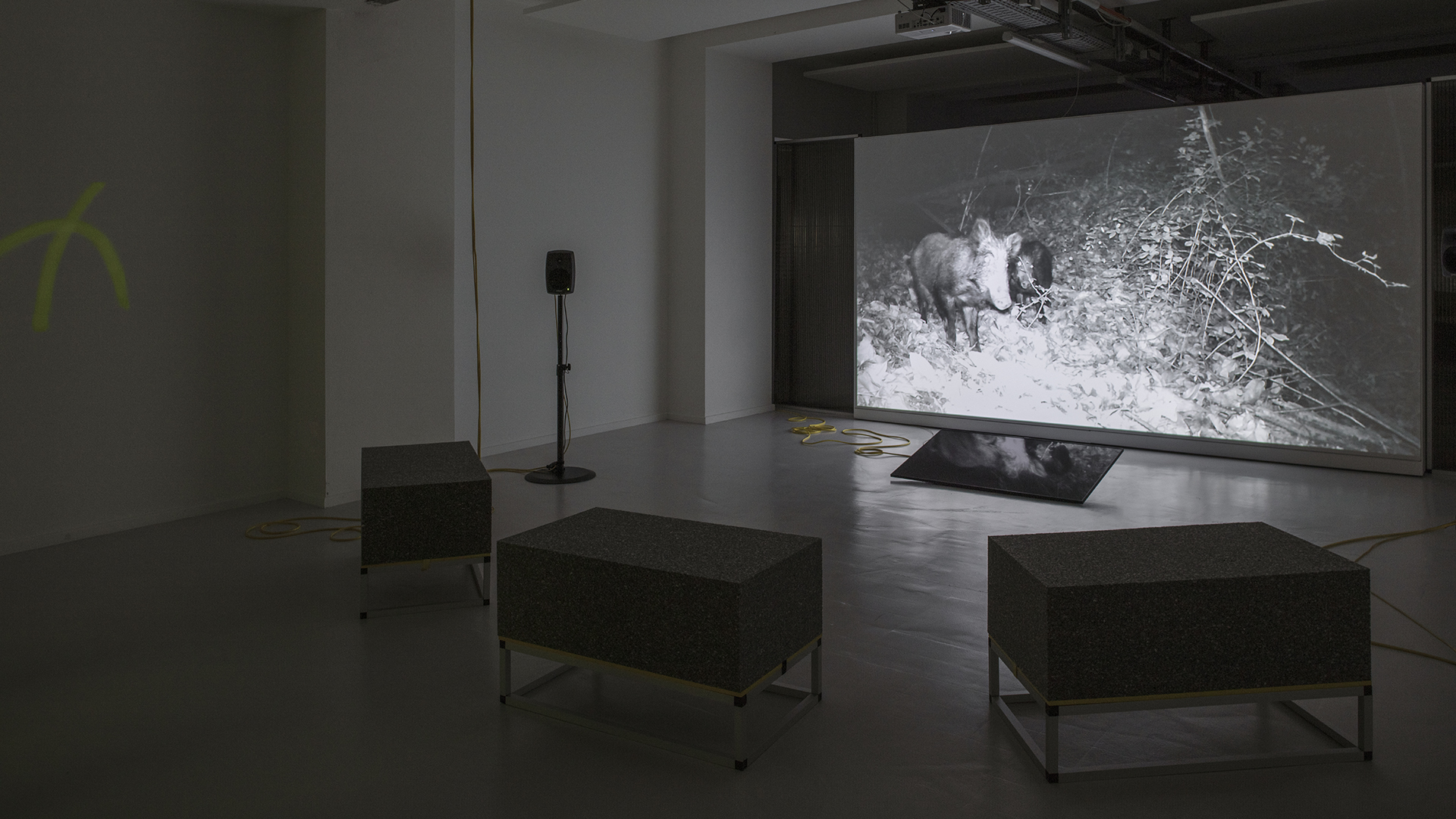
Notes for Les Sanglièrs and Indications of Guilt Pt 1. were presented as part of the remote. response. request. series of film exhibitions at transmediale festival 2021. Crossing the lines between cinema, exhibition, and performance, remote. response. request. offered a distinct film-festival format through a series of commissioned works extended across the transmediale studio space and website.
In 1978, philosopher Nelson Goodman posited that there is no one objective world or reality, only the multiple, subjective worlds we construct. Given power by our belief in their foundational values, these worlds go on to enfold and inform our lives in tangible ways. remote. response. request. II. aims to lay bare how concepts that underpin Western systems of reality – money, private property, the legal system, borders and the nation state – are themselves fictions. The programme brings together two filmmakers who employ different applications of worldbuilding as a form of refusal in their work.
In notes for les sanglières , Elsa Brès constructs a non-human world that exposes the erroneous fiction of human sovereignty over Nature. With a pack of algorithmically animated boars as protagonists, Brès reveals the fallacy of anthropocentrism, until the idea of our primary place within the Earth’s ecology becomes a delusion.
In research she undertook for the production of Indications of Guilt, pt.1 , artist Maud Craigie refers to the process of “bad evidence” – a term used by US police to describe intelligence that challenges their existing theory of a case. Bad evidence relates to a legal principle that once detectives have established a probable cause, they are under no obligation to follow leads that may exonerate the defendant. The job of a detective, in other words, is to create a hypothetical, story-driven world, based on the links of causality along with biased intuition – much like the intrigues of a crime drama. Designed in the interrogation room, this speculative world proceeds to be legitimised and actualised through the infrastructures of the courts and the legal system. Craigie confronts this process in order to draw attention to the alarming frequency of miscarriages of justice within the US legal system.
remote. response. request. II. brings together two filmmakers who speak to the responsibility of the image in conceiving new worlds that can point to different systems of reality; an investment in the belief of the role film can play in effecting social change.
Artists:
Elsa Brès and Maud Craigie
Photos:
Luca Girardini and Ben Evans James
In 1978, philosopher Nelson Goodman posited that there is no one objective world or reality, only the multiple, subjective worlds we construct. Given power by our belief in their foundational values, these worlds go on to enfold and inform our lives in tangible ways. remote. response. request. II. aims to lay bare how concepts that underpin Western systems of reality – money, private property, the legal system, borders and the nation state – are themselves fictions. The programme brings together two filmmakers who employ different applications of worldbuilding as a form of refusal in their work.
In notes for les sanglières , Elsa Brès constructs a non-human world that exposes the erroneous fiction of human sovereignty over Nature. With a pack of algorithmically animated boars as protagonists, Brès reveals the fallacy of anthropocentrism, until the idea of our primary place within the Earth’s ecology becomes a delusion.
In research she undertook for the production of Indications of Guilt, pt.1 , artist Maud Craigie refers to the process of “bad evidence” – a term used by US police to describe intelligence that challenges their existing theory of a case. Bad evidence relates to a legal principle that once detectives have established a probable cause, they are under no obligation to follow leads that may exonerate the defendant. The job of a detective, in other words, is to create a hypothetical, story-driven world, based on the links of causality along with biased intuition – much like the intrigues of a crime drama. Designed in the interrogation room, this speculative world proceeds to be legitimised and actualised through the infrastructures of the courts and the legal system. Craigie confronts this process in order to draw attention to the alarming frequency of miscarriages of justice within the US legal system.
remote. response. request. II. brings together two filmmakers who speak to the responsibility of the image in conceiving new worlds that can point to different systems of reality; an investment in the belief of the role film can play in effecting social change.
Artists:
Elsa Brès and Maud Craigie
Photos:
Luca Girardini and Ben Evans James













